
The Mahābhārata is one of the two major Sanskrit epics of ancient India revered as Smriti texts in Hinduism, the other being the Rāmāyaṇa. It narrates the events and aftermath of the Kurukshetra War, a war of succession between two groups of princely cousins, the Kauravas and the Pāṇḍavas.

Apsaras are a member of a class of celestial beings in Hindu and Buddhist culture. They were originally a type of female spirit of the clouds and waters, but, later play the role of a "nymph" or "fairy". They figure prominently in the sculptures, dance, literature and paintings of many South Asian and Southeast Asian cultures.
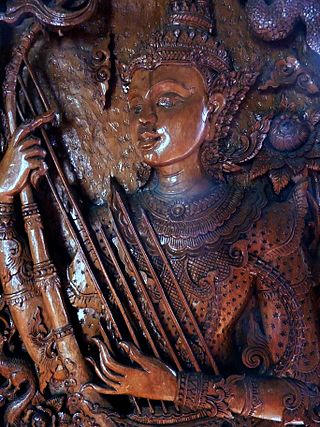
A gandharva is a member of a class of celestial beings in Indian religions, such as Hinduism, Buddhism, and Jainism, whose males are divine performers such as musicians and singers, and the females are divine dancers. In Hinduism, they are regarded to be the celestial demigods who serve as the musicians of the devas.
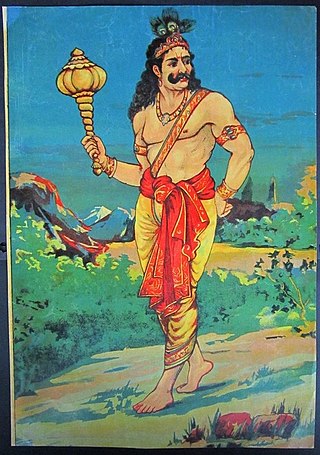
Bhima, also known as Bhimasena, is a hero and one of the most prominent figures in the Hindu epic Mahabharata, renowned for his incredible strength, fierce loyalty, and key role in the epic's narrative. As the second of the five Pandava brothers, Bhima was born to Kunti—the wife of King Pandu—through the blessings of Vayu, the wind god, which bestowed upon him superhuman strength from birth. His rivalry with the Kauravas, especially Duryodhana, defined much of his life, with this tension ultimately erupting in the Kurukshetra War, where Bhima killed all hundred Kaurava brothers.
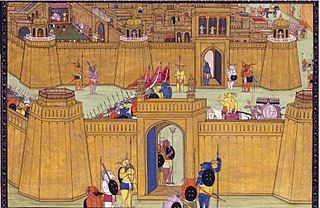
Lanka is the name given in Hindu epics to the island fortress capital of the legendary Rakshasa king Ravana in the epics of the Ramayana and the Mahabharata. The fortress was situated on a plateau between three mountain peaks known as the Trikuta Mountains. The ancient city of Lankapura is said to have been burnt down by Hanuman. After its king, Ravana was killed by Rama with the help of Ravana's brother Vibhishana, the latter was crowned king of Lankapura. His descendants were said to still rule the kingdom during the period of the Pandavas. According to the Mahabharata, the Pandava Sahadeva visited this kingdom during his southern military campaign for the rajasuya of Yudhishthira. The palaces of Ravana were said to be guarded by four-tusked elephants.

Kaurava is a Sanskrit term which refers to descendants of Kuru, a legendary king of India who is the ancestor of many of the characters of the epic Mahabharata. Usually, the term is used for the 100 sons of King Dhritarashtra and his wife Gandhari. Duryodhana, Dushasana, Vikarna and Chitrasena are the most popular among the brothers. They also had a sister named Dussala and a half-brother named Yuyutsu.
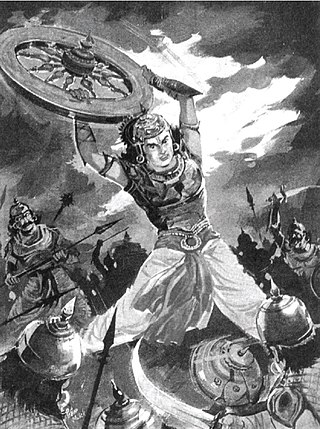
Abhimanyu is a warrior in the Hindu epic Mahābhārata. He was a young and valiant warrior of the Kuru lineage, born to Arjuna—the third Pandava brother—and Subhadra—the sister of the deities Krishna and Balarama. He was also one of the few individuals, along with his father, who knew the technique to enter the Chakravyuha, a powerful military formation. Abhimanyu was raised by his maternal family in Dvārakā because the Pandavas had been exiled for thirteen years by their cousins, the Kauravas. After his father's return, his marriage was arranged with Uttarā, the princess of the Matsya Kingdom.

Karna, also known as Vasusena, Anga-Raja, Sutaputra and Radheya, is one of the major characters in the Hindu epic Mahābhārata. He is the son of Surya and princess Kunti. Kunti was granted the boon to bear a child with desired divine qualities from the gods and without much knowledge, Kunti invoked the sun god to confirm it if it was true indeed. Karna was secretly born to an unmarried Kunti in her teenage years, and fearing outrage and backlash from society over her premarital pregnancy, Kunti had to abandon the newly born Karna adrift in a basket on the Ganges. The basket is discovered floating on the Ganges River. He is adopted and raised by foster Suta parents named Radha and Adhiratha Nandana of the charioteer and poet profession working for king Dhritarashtra. Karna grows up to be an accomplished warrior of extraordinary abilities, a gifted speaker and becomes a loyal friend of Duryodhana. He is appointed the king of Anga (Bihar-Bengal) by Duryodhana. Karna joins the losing Duryodhana side of the Mahabharata war. He is a key antagonist who aims to kill Arjuna but dies in a battle with him during the Kurushetra war.

Urvashi is the most prominent apsara mentioned in the Hindu scriptures like the Vedas, the epics Ramayana and Mahabharata, as well as the Puranas. She is regarded as the most beautiful of all the apsaras, and an expert dancer.
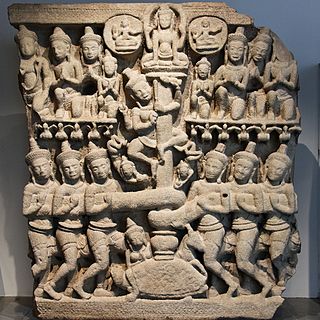
Hindu mythological wars are the wars described in the Hindu texts of ancient India. These wars depicted both mortals of great prowess as well as deities and supernatural beings, often wielding supernatural weapons of great power. Hindu teachings prescribe war as the final option, to be employed only after all peaceful methods are exhausted. Participation in righteous war, or dharmayuddha, was said to be honourable and was a principal duty of the Kshatriya or the warrior varna, and victory in such wars was regarded as a matter of honour.
The historical Avanti kingdom of ancient India is described in the Mahabharata epic. Avanti was divided into north and south by river Vetravati. Initially, Mahissati was the capital of southern Avanti, and Ujjaini was of northern Avanti, but at the times of Mahavira and Buddha, Ujjaini was the capital of integrated Avanti. The country of Avanti roughly corresponded to modern Malwa, Nimar and adjoining parts of the Madhya Pradesh.

Mahabharat is an Indian Hindi-language epic television series based on the ancient Sanskrit epic Mahabharata. The original airing consisted of a total of 94 episodes and were broadcast from 2 October 1988 to 24 June 1990 on Doordarshan. It was produced by B. R. Chopra and directed by his son, Ravi Chopra. The music was composed by Raj Kamal. The script was written by Pandit Narendra Sharma and the Hindi/Urdu poet Rahi Masoom Raza, based on the epic by Vyasa. Costumes for the series were provided by Maganlal Dresswala. The serial claims to have used the Critical Edition of Bhandarkar Oriental Research Institute as its basic source with Vishnu Sitaram Sukthankar and Shripad Krishna Belwalkar as its primary editor.
The Mahabharata is one of the two major Sanskrit epics of ancient India, the other being the Ramayana.
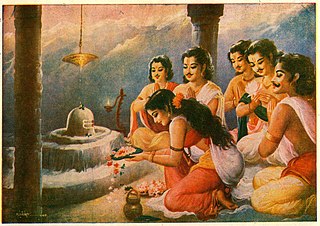
The Vana Parva, also known as the "Book of the Forest", is the third of eighteen parvas in the Indian epic Mahabharata. Vana Parva traditionally has 21 parts and 324 chapters. The critical edition of Vana Parva is the longest of the 18 books in the epic, containing 16 parts and 299 chapters.
In the Hindu epic Mahabharata, the Upapandavas, also known as Pandavaputras, Draupadeyas or Panchakumaras are the five sons of Queen Draupadi from each of the five Pandavas. They are Prativindhya, Sutasoma, Shrutakarma, Shatanika and Shrutasena. They were Maharathis, as mentioned by Bhishma, and fought the Kurukshetra war on the side of the Pandavas and slew many enemy warriors. They were as ferocious as their fathers but other than that, not much is said in the Mahabharata about the brothers. They were very strong and they were only defeated by remarkably few Kaurava warriors.
Arjun is an Indian male given name, which means lustrous, shiny white, color of the lightning; of the milk; of silver; made of silver. It is also the name of the Arjun tree due to its silvery bark; Name of lndra, and of the third of the Pandava prince
The Ghosayatra Parva is a section and an episode of the Hindu epic Mahabharata. Consisting of 519 shlokas, it is named after the episode in which the Kauravas undertake an expedition to see the cowherds of Dvaitavana, a forest where the Pandavas reside. This is done under the pretext of cattle inspection, but with the ulterior motive of humiliating their cousins. During the course of this episode, the Kauravas are captured by the gandharvas, and are released from their captivity by the Pandavas. Duryodhana finds the outcome of the entire affair embarrassing, and resolves to fast to death until he is dissuaded from this course of action. Instead, he opts to return to Hastinapura to perform a sacrifice.
Deshamanya Vajira Chitrasena was a Sri Lankan traditional dancer, choreographer and teacher. Vajira is regarded as Sri Lanka's first prima ballerina. She is the first Sri Lankan woman to practise the traditional Kandyan dance which was traditionally performed only by men. Vajira is credited with creating brand for a female style of Kandyan dancing and setting the tone for women to become ritual dancers. She was married to Chitrasena who was a well known legendary dancer and dance guru.

Indra Dassanayake was a Sri Lankan academic, emeritus professor in Hindi, a scholar known for promoting the Hindi language and North Indian culture in Sri Lanka through educational institutions. On 26 January 2020, she was conferred the Padma Shri award posthumously.












